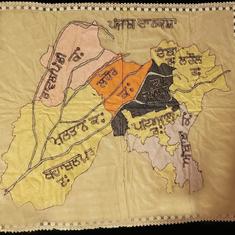Last weekend in Vancouver, people attending the play The Undocumented Trial of William C. Hopkinson got a chance to relive a part of Canadian history that’s usually seen as a mere footnote in official textbooks.
The play tells the story of Mewa Singh, a young Sikh man who emigrated to Canada from India in 1906. He was involved in the Ghadar Party movement seeking Indian independence from British rule and killed immigration officer William C Hopkinson in 1915, an act for which he was tried and hanged. This incident is considered a closing chapter in the 1914 story of the Komagata Maru steamship, in which Sikhs were turned away from Canadian shores. It is now widely accepted as an example of a “deliberate, exclusionary policy of the Canadian government to keep out ethnicities it deemed unfit to enter the country [in order to] keep Canada a White Man’s Country”.
Singh’s story may be lore for many members of the South Asian Canadian diaspora, and more specifically the Sikh community in British Columbia. But others in Canada – many of whom knew nothing of Komagata Maru incident until the centennial commemoration – have no idea of the role that Singh played.
The story goes that Hopkinson, who had lived in India and was fluent in Hindi, was working as an intelligence agent in Vancouver, “monitoring any perceived seditious, anti-British activities among the South Asian population… particularly after the formation of the Ghadar Party in North America”. He employed informants and created friction within the South Asian community. Another one of his informants, Bela Singh, ended up killing two men in a gurdwara. When Hopkinson tried to recruit Mewa Singh, his response was to shoot him. In a written statement, Mewa Singh explained his actions by blaming Hopkinson for creating trouble in his community.
Close to home
For Paneet Singh, the writer of the play, that history helped make sense of his own contemporary struggle. Growing up as an observant Sikh, he often felt like an outsider.
“I felt this dichotomy – on the one hand, I was going to the gurdwara, and then I had a separate life watching hockey and all those typical Canadian things,” Paneet Singh said in a telephone interview from Vancouver. “But I was not sure where I belonged.”
He said the identity crisis got worse after the 9/11 terror attacks in New York, when Sikhs wearing turbans and beards were targeted.
“I remember in high school, during winter, two kids pushed me into a pile of snow, and were throwing snowballs at me, calling me Osama Bin Laden,” Paneet Singh said. “When I learnt about Mewa Singh, and his defiance, and his armed resistance that fit in with the Sikh ethos, it solidified my place. The history of Mewa Singh is no different than the history of [Canadian icon] Terry Fox. He made me feel I belong here, he brought my worlds together.”
Although Paneet Singh had been researching Mewa Singh’s history out of personal interest for years, he embarked on writing The Undocumented Trial of William C. Hopkinson last year. Last January, he was part of a group that commemorated the centennial of Mewa Singh’s execution by organising a funeral procession, which was preceded by a panel discussion on the legacy of Mewa Singh. He was mulling over creating a short documentary or film on Mewa Singh, when the idea of a site-specific play crossed his mind.
“I’ve had a sporadic realisation that we don’t know our own local history,” he said. “When I started doing my research, I went into the archives, looked at news reports, pulled up microfilms… A few months later, I was on this quest to find the jail where Mewa Singh was held. Although I had heard the story so many times orally – from my mother or other elders – there were different versions. And I thought, Mewa Singh got capital punishment, there must be records somewhere.”
In the end, this piece of information was found far closer to home.
“I have travelled so many times to Punjab, and visited different historical sites,” he said. “But I was not connected to this monumental piece of Canadian history. And as it happens, I live five minutes from where Mewa Singh was hanged. But there is no homage, no marker.”
The site-specific play that Paneet Singh ended up writing is being staged at the Vancouver Art Gallery, which was once the Vancouver Provincial Courthouse where Mewa Singh’s trial took place in October 1914. The play, which runs till January 11 – the day that Mewa Singh was executed – aims to re-examine the trial, “transforming it from an open-and-shut case to a surreal debate of conscience,” according to the playbill. All shows are sold out.
Coming to terms
According to Gurpreet Singh, a journalist and author of a book on Mewa Singh, the story of Hopkinson’s assassin is not very well-known especially among the larger South Asian Canadian diaspora across Canada. He said that this is partially because of the older generation’s cautionary attitude about valourising someone who killed a Canadian government official.
Gurpreet Singh learnt about Komagata Maru and Mewa Singh only after he came to Canada in 2001.
“Throughout my schooling in India – I went to Kendriya Vidyalaya – nowhere ever did I have the opportunity to read about the Ghadar history,” said Gurpreet Singh, who is also a talk show host for Spice Radio in Burnaby, British Columbia. “We read about Mahatma Gandhi, Bhagat Singh, Chandrashekhar Azad… but never the Ghadar Party. I had a brief idea because I have relatives in Jalandhar, and there is a Ghadar memorial there. But this has never been part of popular or mainstream history.”
While studying social history at the University of British Columbia, Gurpreet Singh proposed writing on Mewa Singh. Though professors welcomed the idea, many elders in the Sikh community discouraged him for bringing up an "inconvenient history".
Now, there are many groups trying to keep Mewa Singh’s legacy alive, and some that are petitioning him to be declared a Canadian hero.
“What he stood for would be recognised as Canadian values today – against racism, for equality,” said Gurpreet Singh. “There are some youngsters who are doing a good job, trying to get a plaque to recognise him or get January 11 recognised as Mewa Singh Day.”










